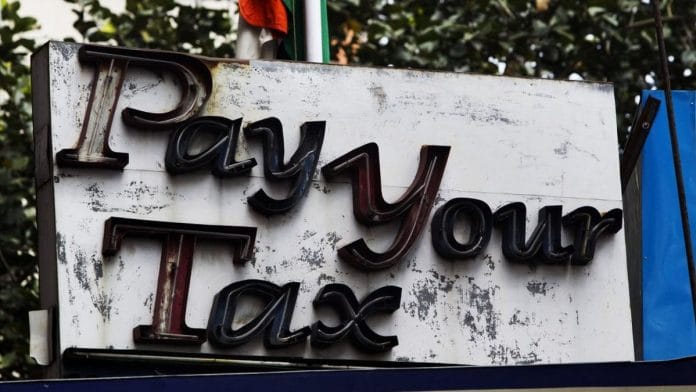New Delhi: The Narendra Modi government has sent out a clear message to Income Tax officers, especially those working in the field — ensure 100 per cent targets are met, or be ready for consequences. Their performance will be an “important factor in determining their future postings”, according to a 21 February office memorandum issued by a senior Central Board of Direct Taxes functionary, which has been accessed by ThePrint.
The Modi government has set a target to earn Rs 2 lakh crore from the ambitious ‘Vivaad Se Vishwas’ scheme, and the memorandum informs officers that their targets under the scheme have been fixed at “100 per cent of the disputed cases with disputed tax demand which fulfil the eligibility conditions under the scheme”.
The memorandum states that “performance of field officers in respect of ‘Vivaad Se Vishwas Scheme’ shall be an essential factor in their finalising their annual performance appraisal reports”.
The scheme has not been passed by Parliament.
Also read: As tax collections lag, finance ministry asks taxmen to crack down on tax evasion
Expanding scope of the scheme
The government is continuing to recast the ambit of the ‘Vivaad Se Vishwas’ scheme to bring more revenue-generating areas under it.
At a recent video conference with senior functionaries of the Income Tax Department, the revenue department of the finance ministry and the CBDT indicated that suspicious penny stock transactions and accommodation entries — those that deal with bogus or suspicious loan transactions, bogus or suspicious share capital transactions, bogus or suspicious share premium payments, cash deposits etc. — will also be under the purview of the ‘Vivaad Se Vishwas’ scheme.
Among the category of cases included in the scheme are search cases where tax effect is less than Rs 5 crore, DPR or international tax dispute cases, and revision cases under Section 264 of the Income Tax Act, which deal with the powers of commissioners in certain types of cases.
Senior officers told ThePrint that the final parameters of the scheme will become clear around 3 March.
Penny stocks
Bringing transactions in penny stocks under the scanner has been a long-time intent of the Modi government. This, government sources say, is also part of the plan to shore up the government’s revenues.
The move will see the CBDT going after those who profited from questionable investments in penny stocks. As part of this move, fresh standard operating procedures (SOPs) have been issued by the CBDT and circulated among senior Income Tax Department officers.
Listed companies, or even unlisted ones, whose market price is less than their face value are categorised as penny stocks. In several cases, the companies exist only on paper, but their stock is exchanged to give financial benefits to the investors.
Sources said internal assessments of the CBDT have pegged the amount involved in penny stocks transactions in the region of Rs 9 lakh crore, and the government hopes to make a windfall if “even 25 per cent of these deals are exposed”.
In 2016, the CBDT had identified a lot of high value transactions in penny stocks, after which notices had gone out to those who made huge gains but didn’t pay taxes on the gains. But most of the cases are stuck at various levels, including various Income Tax Appellate Tribunals.
Sources in the finance ministry told ThePrint that there have been “suspicious movements” in a lot of penny stocks, some of them red-flagged by stock market regulator Securities and Exchange Board of India (SEBI), and the aim now is to go after the end-beneficiaries of such stock manipulations.
Last year, a Mumbai bench of the Income Tax Appellate Tribunal had directed the Income Tax department to not penalise penny stock investors if the company they invested in was under SEBI scrutiny.
Also read: Modi govt wants to bring back ‘Raid Raj’, tells taxmen to ‘use whatsoever means required’






